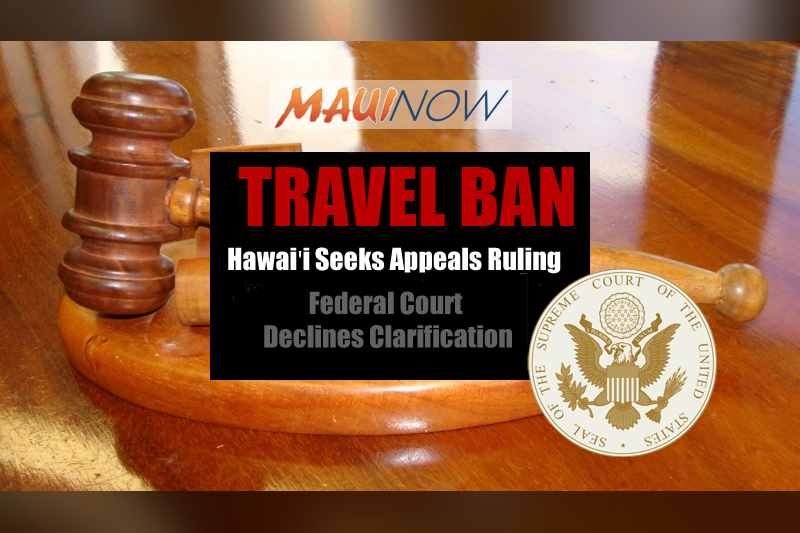Hawaiʻi Seeks Appeals Ruling on Travel Ban Scope
This morning, the state of Hawaiʻi asked the Ninth Circuit Court of Appeals to review the scope of the Trump administration’s travel and refugee bans after federal district court Judge Derrick K. Watson declined to grant Hawaiʻi’s motion for clarification on Thursday.

Maui Now graphic.
In its order, the federal court did not address the substance of either party’s arguments regarding the proper scope of the injunction; but rather focused on the procedural question regarding which court is the appropriate forum to decide the merits of Hawaiʻi’s motion.
On June 26, 2017, the United States Supreme Court agreed to hear arguments in October regarding this case. In a 6-3 decision, the Court ordered that while arguments were pending, people from the six Muslim-majority countries with no connection to the United States may not enter the country, but those with a good faith connection to a US individual or entity may enter. The same standard applies with respect to refugee admissions.
Hawaiʻi alleges that the Trump Administration’s guidelines issued on June 29 are overly restrictive and do not comply with the Supreme Court’s ruling. That same day, Hawaiʻi asked the federal district court to clarify the Supreme Court’s order.
Yesterday’s order from Judge Watson declined to address the merits of the request and suggested that Hawaiʻi instead seek clarification from the Supreme Court. Judge Watson also stated that he would rule on the merits if instructed to do so by the higher court.
Today’s motion is directed to the Ninth Circuit Court of Appeals for first review. This tracks the ordinary process for appeals within the federal courts and is done to indicate to the Supreme Court that Hawaiʻi followed proper procedures in the courts below.
Attorney General Chin said, “We are now in the middle of a 90-day partial travel ban. The Trump Administration has reserved the option to extend or even expand the travel ban at the end of it. Many felt the balance struck by the Supreme Court was nuanced and fairly reasonable, but the Trump Administration has flouted the Supreme Court’s order from the start. What happens in the next several weeks matters a lot if the administration is not subject to the checks and balances of the courts.”
Today’s motion states in part:
“Parties seeking to clarify or enforce an injunction—even an injunction that has been partially stayed by the Supreme Court—must seek relief in the first instance from the district court that issued it. That is precisely what the State of Hawaiʻi and Dr. Elshikh did when they became aware that the Government intended to flagrantly violate the injunction against the President’s thinly veiled Muslim bans. They had obtained the injunction from the District Court of the District of Hawaiʻi to protect their own constitutional and statutory rights, as well as the rights of the citizens of the State of Hawaiʻi and the United States as a whole. They therefore returned to that District Court to ensure that injunction was followed and their rights were vindicated. But the District Court refused to grant this relief, making the assertion—endorsed by no party—that Plaintiffs must seek relief directly from the Supreme Court.
That is wrong. For over a week, the Government has been unlawfully excluding foreign nationals and thereby inflicting irreparable harm on the American individuals and entities with whom they have relationships. For over a week, the Government has been ignoring the dictates of the Judicial Branch, fashioning and imposing a new Muslim ban wholly divorced from any national security rationale. Every day that passes is a day when our Government is turning away human beings—from newborn children to elderly grandparents—whom the injunction requires to be admitted. It is therefore incumbent on this Court to fulfill its traditional role by reversing the District Court’s erroneous holding and issuing the injunctive relief necessary to ensure that Plaintiffs’ statutory and constitutional rights are protected in the manner intended by the District Court, this Court, and the Supreme Court itself.”










